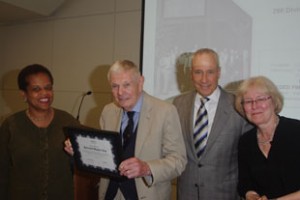Yesterday marked the 40th anniversary of NPR.
But if the U.S. military had killed Osama bin Laden back then, many NPR stations would not have been able to bring you live coverage. In fact, they'd have had to wait for that day's edition of "All Things Considered" to arrive by mail. It was called "bicycling": transporting the physical recording to a station, playing it, and then sending it on to the next station. Larger radio networks, like CBS, had interconnects for live programs, but Bernard Mayes, KQED-FM's first station manager and NPR's first board chairman, says most stations couldn't afford that.
"It took a lot of doing to get the stations to improve ... their quality of their studios and their signal and their staff and their training," Mayes says. "All that had to be done before we could say this is a whole system that's working well."

KQED hired Mayes, a former BBC broadcaster, to run the radio station it acquired from the Presbyterian Church. KXKX-FM became KQED in 1969, modeling its membership format after KPFA's in Berkeley. KQED was pretty unique among the 90 original NPR stations: partly because it was not owned by a college or university. Educational broadcasting, pushed by advocates like former FCC commissioner Frieda Hennock, was one of the few places to hear radio without commercials. Now, Americans would get a taste of noncommercial news radio. Unless they lived near Canada and could get the CBC, or had heard the BBC, that was a new idea that took some getting used to.
"People were not used to having noncommercial anything," Mayes recalls. "To persuade people to listen to (NPR) was to change their habits. And this was not easily done, because there were not skillful broadcasters available to do it until we had managed to gather them all together in one roof."
